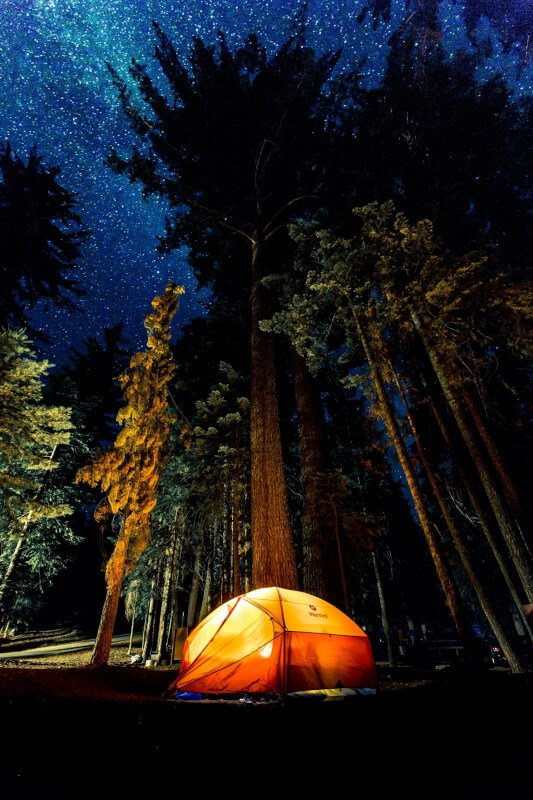Are you getting ready for an exciting camping trip? Well, look no further! In this article, we have compiled the best camping packing tips to ensure that your adventure is well-organized and stress-free. From essential gear and clothing to useful hacks and tricks, we’ve got you covered. So sit back, relax, and let us guide you on how to pack like a pro for your next outdoor escapade.
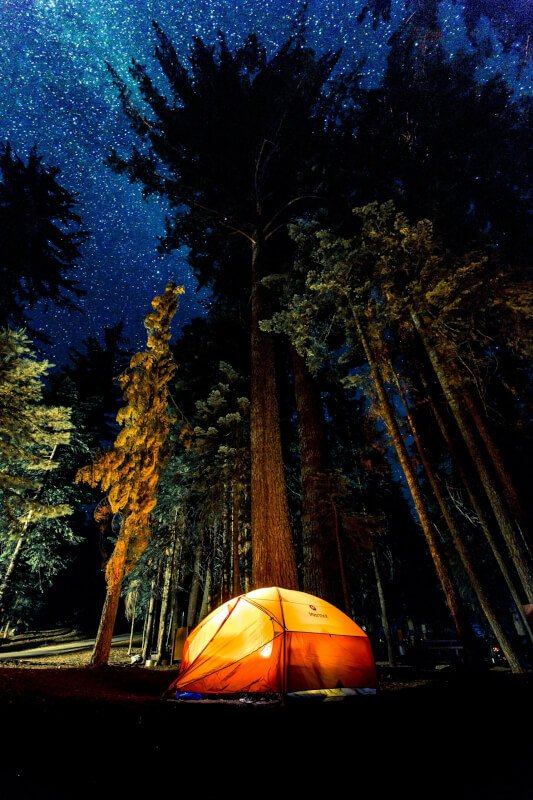
Choosing the Right Gear
Selecting the Tent
When it comes to camping, your tent serves as your home away from home. It’s essential to choose a tent that suits your needs and the conditions of your camping trip. Consider factors such as the size of the tent, the number of people it can accommodate, and the ease of setup. Look for tents that are durable, weather-resistant, and have good ventilation. Additionally, consider the weight and packability of the tent, especially if you are backpacking. Research different tent options and read reviews to make an informed decision.
Sleeping Essentials
A good night’s sleep is crucial for enjoying your camping adventure to the fullest. Invest in a quality sleeping bag that is appropriate for the expected temperatures. Look for a sleeping bag that is lightweight, compact, and insulated. Pair it with a comfortable sleeping pad or mattress for extra insulation and cushioning. If you’re camping in colder conditions, consider using a sleeping bag liner for added warmth. Don’t forget to pack a pillow or use a bundle of clothes to support your head while sleeping.
Cooking Supplies
Cooking meals outdoors is one of the joys of camping. To ensure you have everything you need, make a list of essential cooking supplies. Include a portable stove or grill, camping cookware, utensils, and a can opener. Don’t forget to pack a lighter or matches for starting your stove or campfire. Consider bringing a roll-up table for food preparation and a collapsible sink for easy dishwashing. Remember to pack some aluminum foil, ziplock bags, and garbage bags for food storage and waste management.
Lighting Options
Proper lighting is essential for navigating your campsite, cooking after sunset, and finding your way to the bathroom at night. Pack a headlamp or flashlight with extra batteries to ensure you have a reliable light source. Lanterns can also add ambient lighting to your campsite. Consider solar-powered options for an eco-friendly lighting solution. Hang string lights or set up LED light strips to create a cozy atmosphere. Don’t forget to pack some candles or a small campfire for a warm and inviting glow.
Clothing and Personal Items
Layering Techniques
When packing your clothing, consider the layering technique to ensure you’re prepared for various weather conditions. Layering involves wearing multiple thin layers that can be added or removed as needed. Start with a moisture-wicking base layer to keep you dry and comfortable. Add an insulating layer for warmth, such as a fleece jacket or down vest. Finally, top it off with a waterproof and windproof outer layer to protect you from the elements. Don’t forget to pack extra socks, underwear, and a hat to keep you cozy.
Appropriate Footwear
Choosing the right footwear is vital for a comfortable camping experience. Opt for sturdy and waterproof hiking boots or shoes that provide good traction and ankle support. Break them in before your camping trip to avoid blisters or discomfort. Bring a pair of camp shoes or sandals to give your feet a break at the campsite. Pack enough pairs of socks to keep your feet dry and cozy throughout your adventure.
Hygiene Essentials
Staying clean and maintaining personal hygiene is crucial while camping. Pack travel-sized toiletries such as toothpaste, toothbrush, soap, and shampoo. Consider biodegradable options to minimize your impact on the environment. Don’t forget to bring a quick-drying towel and some wet wipes for refreshing yourself. Hand sanitizer is also a must-have to keep your hands clean when water isn’t readily available.
Safety Equipment
Camping involves certain risks, so it’s important to pack essential safety equipment. Include a first aid kit with bandages, antiseptic wipes, pain relievers, and any necessary medications. Carry a whistle for attracting attention in case of emergencies. A multipurpose tool, such as a Swiss Army knife, can come in handy for various tasks. If you’re camping in bear country, consider bringing bear spray or bear-proof canisters for storing your food.
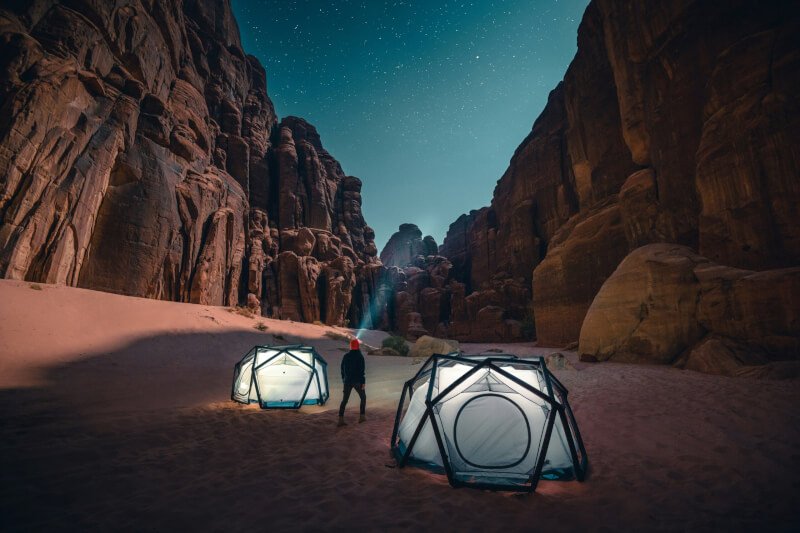
Food and Water
Meal Planning
Planning your meals in advance is key to a successful camping trip. Consider the duration of your trip, the number of people, and any dietary restrictions. Opt for meals that are easy to prepare and require minimal cooking equipment. Pack non-perishable items such as canned goods, dry fruits, nuts, and granola bars. Include dehydrated or freeze-dried meals that only require boiling water. Don’t forget to bring enough snacks to keep you energized throughout the day.
Proper Food Storage
Keeping your food safe from animals and spoilage is crucial. Utilize airtight containers or resealable bags to store your food. Consider using coolers or insulated bags for perishable items. Freeze water bottles or gallon jugs to use as ice packs, reducing the need for extra ice. Keep your food separate from your tent to avoid attracting animals. Hang your food in a bear bag or store it in bear-proof containers if camping in bear country.
Water Filtration Systems
Access to clean water is essential for any camping adventure. While some campsites may have potable water available, it’s always a good idea to bring your own filtration system. Consider using a water filter or purifier to remove impurities and make water safe for drinking. Alternatively, bring water purification tablets or a UV water sterilizer. Carry enough water bottles or a hydration bladder to stay hydrated throughout the day.
Snack Options
Snacks are essential for keeping your energy levels up during outdoor activities. Pack a variety of snacks that are lightweight, non-perishable, and easy to grab on the go. Opt for options such as energy bars, trail mix, dried fruits, jerky, and individual snack packs. Don’t forget to include some indulgent treats for those cozy campfire evenings.
First Aid and Emergency Preparedness
Basic First Aid Kit
A well-stocked first aid kit is a must-have for any camping trip. Include items such as adhesive bandages, gauze pads, antiseptic ointment, tweezers, and scissors. Pack any necessary medications, such as pain relievers, allergy medicine, and prescribed medications. Don’t forget to include a first aid manual or guidebook for reference.
Essential Medications
If you have any pre-existing medical conditions, ensure you have an ample supply of your prescribed medications. Bring extra in case of any unforeseen circumstances or delays. Keep medications in a waterproof container and store them in a cool and dry place.
Emergency Contact Information
In case of emergencies, it’s important to have the necessary contact information readily available. Make a list of emergency contacts, including local emergency services, park rangers, and the contact information for your traveling companions. Store this information in your phone and keep a printed copy in your backpack.
Navigational Tools
Navigating your surroundings is crucial for a safe and enjoyable camping trip. Pack essential navigational tools such as a compass, map, and GPS device. Familiarize yourself with the area before your trip, and mark any important landmarks or points of interest on your map. Consider bringing a portable charger or extra batteries for your electronic devices.
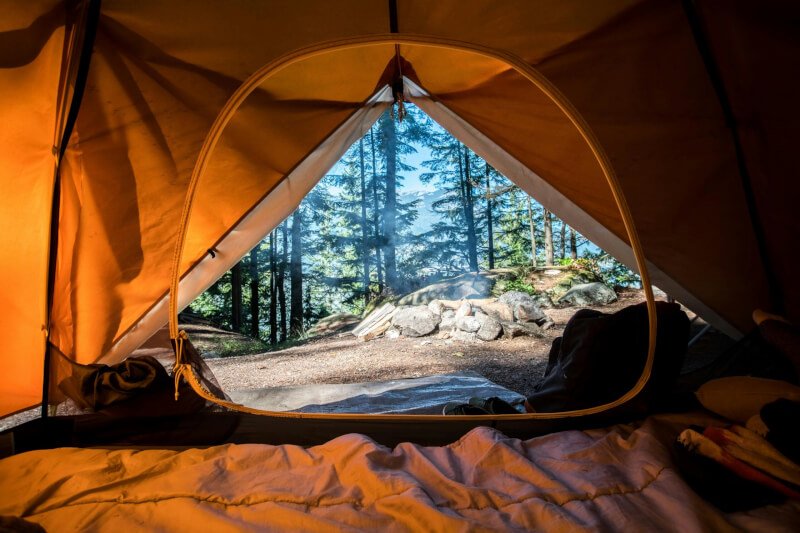
Storage and Organization
Packing Cubes and Bags
To keep your gear organized and easily accessible, consider using packing cubes and bags. These handy organizers can help separate your clothing, toiletries, cooking supplies, and other essentials. Use different colored cubes or labels to distinguish between items and easily find what you need. Compression bags can also save space in your backpack and keep your clothes compact.
Labeling and Categorizing
Labeling your gear and categorizing items can be a time saver when setting up camp. Use waterproof labels or markers to identify your gear, especially if you’re traveling with a group. Categorize items into different storage containers or bags, such as a kitchen bag, clothes bag, and toiletry bag. This will help you locate items quickly and efficiently.
Compact Camping Furniture
Bringing some camping furniture can enhance your comfort at the campsite. Look for compact and lightweight options such as collapsible chairs, foldable tables, and portable hammocks. Consider the comfort and durability of the furniture, and ensure it fits well within your packing space.
Trash Management
Keeping the campsite clean and minimizing your impact on the environment is essential. Pack extra garbage bags to properly dispose of any waste generated during your trip. Separate recyclables from non-recyclables and follow the “pack in, pack out” principle. Consider bringing a small shovel to bury biodegradable waste properly.
Entertainment and Recreation
Games and Activities
Camping is a great opportunity to unplug from technology and enjoy outdoor games and activities. Pack a deck of cards, a frisbee, a football, or a soccer ball for group games. Consider bringing board games or puzzles for quieter moments inside the tent. A portable speaker can also provide some entertainment with your favorite music.
Outdoor Sports Equipment
If you’re a fan of outdoor sports, make sure to pack the necessary equipment. Bring a hiking backpack, trekking poles, and a comfortable daypack for day hikes. Consider bringing fishing gear, a kayak, or a bicycle depending on the activities you plan to do. Don’t forget to pack safety equipment such as helmets or life jackets if required.
Nature Guides and Books
Immerse yourself in the wonders of nature by bringing along nature guides and books. Choose books about local flora and fauna, bird identification, or hiking trails in the area. Nature guides can help you identify and learn more about the plants, animals, and natural features you encounter during your camping trip.
Digital Entertainment Options
Although camping provides an opportunity to disconnect from technology, having some digital entertainment options can be enjoyable during downtime. Pack a fully charged e-reader or tablet with pre-downloaded books, magazines, or movies. Consider bringing a portable charger or solar-powered charger to keep your devices powered up.

Weather Considerations
Rain Gear
Don’t let unexpected rain dampen your camping experience. Pack waterproof jackets, pants, and hiking boots to keep you dry during wet weather. Bring a waterproof cover for your backpack and ensure your tent has proper rainfly protection. Don’t forget to pack a few extra towels to dry off wet gear and a tarp for additional shelter.
Sun Protection
Protecting yourself from the sun’s harmful rays is crucial when spending extended periods outdoors. Pack sunscreen with a high SPF, sun hats, and sunglasses. Consider bringing a portable shade canopy or an umbrella for additional protection. Don’t forget to drink plenty of water and seek shade during the hottest parts of the day.
Cold Weather Essentials
If you’re camping in colder temperatures, proper insulation is key. Pack layers of warm clothing, thermal underwear, hats, gloves, and thermal socks. A good quality sleeping bag with a low-temperature rating is essential for keeping warm during cold nights. Consider bringing hand warmers and insulating pads for extra comfort.
Bug Repellent
Pesky bugs can quickly spoil the camping experience. Pack insect repellent with DEET or other effective ingredients to keep mosquitoes and ticks at bay. Consider bringing insect-proof clothing or a bug net for added protection. Don’t forget to check for ticks regularly and use proper tick removal techniques if necessary.
Leave No Trace Principles
Pack in, Pack out
Following the principle of “pack in, pack out” ensures that you leave no trace of your visit. This means taking all your trash, including food waste and disposable items, with you when you leave. Utilize the garbage bags you brought and properly dispose of your waste in designated bins or recycling centers.
Responsible Fire Safety
If having a campfire is allowed, practice responsible fire safety. Use designated fire rings or pits and avoid making new fire pits. Never leave a fire unattended and ensure it is completely extinguished before leaving the campsite or going to sleep. Be mindful of local fire restrictions and always follow the campground rules.
Proper Waste Disposal
Dispose of human waste properly by using designated restrooms or portable toilets, if available. If nature calls in the wild, practice Leave No Trace principles by digging a small hole at least 200 feet away from any water source. Cover the hole and pack out any used toilet paper in a sealable bag.
Respecting Wildlife
Camping often brings you closer to wildlife, and it’s important to respect their natural habitat. Keep a safe distance from animals and never feed them. Store your food properly to prevent attracting wildlife, especially bears. Observe wildlife from a distance and never disturb their nests or dens. Leave rocks, plants, and other natural features as you found them.
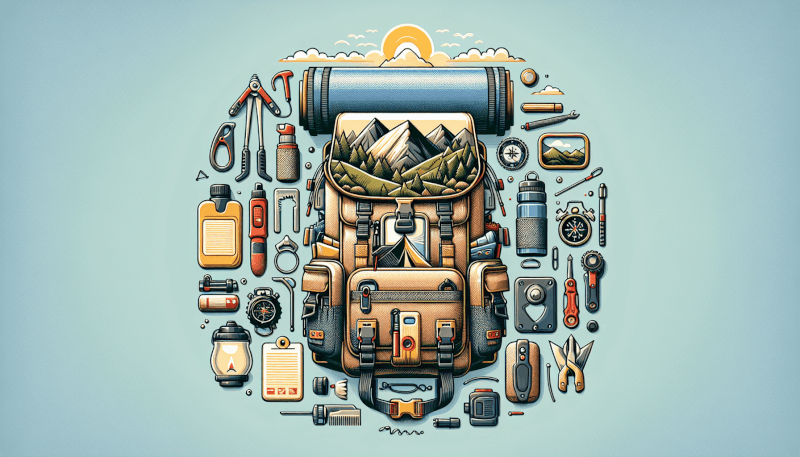
Tips for Efficient Packing
Create a Checklist
Before your camping trip, create a comprehensive checklist to ensure you don’t forget any essential items. Divide your checklist into categories such as shelter, clothing, kitchen supplies, personal items, and entertainment. Refer to this checklist while packing and mark off items as you go to stay organized.
Utilize Multifunctional Items
To maximize space and efficiency, consider packing multifunctional items. For example, a bandana can be used as a headband, towel, or even a water filter. Seek out gear that serves multiple purposes, such as a camping stove that also acts as a grill or a tent with built-in storage pockets.
Roll vs. Fold Technique
When it comes to packing clothing, the roll vs. fold technique can save space and prevent wrinkles. Roll your clothing items tightly to minimize wrinkles and make them more compact. This technique also allows you to see all your clothing at a glance without unpacking everything.
Distribute Weight Evenly
To ensure comfort and stability while hiking or carrying your backpack, distribute the weight evenly. Place heavier items at the bottom and towards the center of your backpack. Keep frequently used items within easy reach, such as water bottles or snacks. Adjust your pack to fit your body properly and use compression straps to stabilize the load.
Final Tips and Recommendations
Practice Setting Up the Tent
Before your camping trip, practice setting up your tent at home or in your yard. Familiarize yourself with the tent’s features and make sure you have all the necessary components. This will save you time and frustration when setting up at the campsite. Additionally, it’s a great opportunity to inspect your tent for any damages or repairs needed.
Check Gear Functionality
Before heading out on your camping adventure, take the time to check the functionality of all your gear. Test your stove, lanterns, and electronic devices to ensure they are in working order. Check for any leaks or damage to your camping gear, such as sleeping bags or hiking boots. It’s better to identify and address any issues beforehand rather than being caught off guard during your trip.
Inform Others of Itinerary
For safety reasons, let someone know about your camping itinerary. Share details such as the location, duration of your trip, and planned activities with a trusted friend or family member. Provide them with emergency contact information and let them know when to expect your return. This way, someone will be aware of your whereabouts in case of any unforeseen circumstances.
Plan for Unexpected Situations
While you might have everything meticulously planned, unexpected situations can always arise. Prepare for unforeseen weather changes, illness, or route alterations. Have backup plans in place and carry extra supplies, such as additional food, water, and clothing. Stay flexible and adapt to any challenges that may come your way, ensuring you can still enjoy your camping adventure to the fullest.
By following these tips and recommendations, you can ensure you have an organized, enjoyable, and memorable camping adventure. Choose the right gear, pack efficiently, and be prepared for different weather conditions and emergencies. Remember to respect nature and practice responsible camping ethics to leave no trace. With proper planning and a positive attitude, your camping trip is sure to be a remarkable experience. Happy camping!

